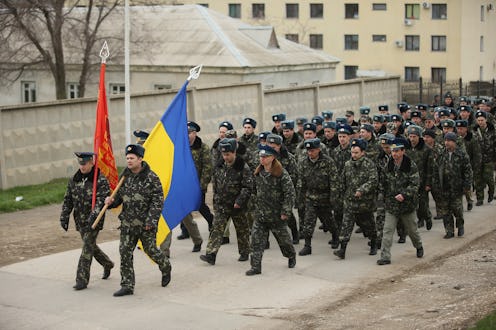News
EU Offers Ukraine $15 Billion, Threatens Russia
Ukraine is gradually inching closer to that $35 billion it needs to get back on its feet. On Wednesday, a top European Union official announced the EU will offer Ukraine an aid package worth $15 billion over the next two years. That package will include loans and grants, and supplement the $1 billion in aid pledged by U.S. Secretary of State John Kerry and another expected offer of roughly $4 billion from the International Monetary Fund.
Coincidentally, the package is the same amount as Russian President Vladimir Putin offered to invest in Ukraine last year following President Viktor Yanukovych's refusal to sign a trade agreement with the EU. That offer has, unsurprisingly, since been rescinded.
The package, announced at a news conference in Brussels by Jose Manuel Barroso, the president of the EU's executive arm, will include $2.2 billion in loans and $1.9 billion in grants from the EU. Around $4.1 billion will come in the form of fresh credit from the European Investment Bank. The aid package is partly contingent on Ukraine signing a deal with the IMF.
The EU is also planning to give Ukraine some of the trade benefits it would have enjoyed, had it signed the EU association agreement last year. It's also working on ways to provide Ukraine with energy via "reverse flows" of gas from western Europe. Meanwhile, if Russia's military presence in Crimea has not "de-escalated" by Thursday, the EU has warned it may vote to impose sanctions on Russia in a planned meeting that day. These sanctions could include visa restrictions, the freezing of assets, and compromised economic ties.
Secretary Kerry is due to meet with Russian Foreign Minister Sergei Lavrov and EU leaders in Paris Wednesday, as a sideline to a long-planned conference on Lebanon.
The U.S. is expected to ask independent observers from the Organization for Security and Cooperation in Europe, of which Russia is a member, to monitor the situation on the Crimean peninsula. The plan would be to assess whether there is any real threat to the Russian-speaking community, and, if not, provide a reason why Russian troops should retreat.
And as for Russia? Well, the country will most likely ask for greater representation for Ukraine's Russian-speaking population in the new Kiev Parliament.
Ahead of the meeting, Russian minister Lavrov reiterated the Russian party line that the troops in the Crimea region are not Russian, and therefore Moscow has no ability to issue orders.
"If you mean the self-defense units created by the inhabitants of Crimea, we give them no orders, they take no orders from us," Lavrov told a questioner at a news conference in Madrid, according to a Reuters report.
"As for the military personnel of the [Russian] Black Sea Fleet, they are in their deployment sites. Yes, additional vigilance measures were taken to safeguard the sites... We will do everything not to allow any bloodshed."
With regard to OSCE observers, Lavrov said it was up to the people of Ukraine to decide whether they want them or not.
There's also likely to be a fair amount of pushback against sanctions the EU plans to levy against Russia. In a press conference on Tuesday, Putin warned that any measures could incur "mutual damage."
